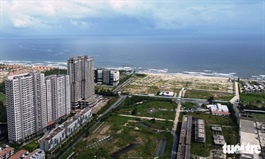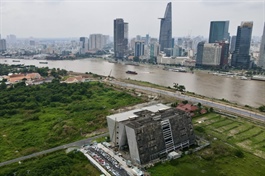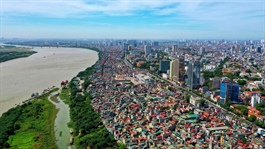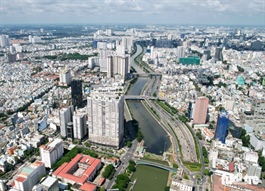Offloading assets a last resort for groups
Offloading assets a last resort for groups
Burdened by large debts and complex capital mobilisation channels, many domestic real estate businesses are looking to sell off their assets as a last resort.

Hoang Anh Gia Lai JSC (HAGL) announced in October that in the third quarter, the company’s profit after tax was $13.5 million, representing an on-year decrease but a triple increase compared to the second quarter, thanks to $7.5 million coming from the sale of its Hoang Anh Gia Lai Hotel.
The hotel, located in Pleiku city of Gia Lai province, was the first 4-star hotel in the Central Highlands region, established in 2005.
HAGL sold the hotel to pay part of the bond debt issued in 2016 at BIDV. All proceeds from the sale of this asset will be given priority to pay for these bond obligations to BIDV.
The company has real estate stretching from north to south, but has gradually sold real estate assets and switched to agriculture production after its rubber business failed in recent years.
In another example, losing business activities and depleted cash flow also forced LDG Investment JSC to restructure assets and projects to repay bonds and ensure cash flow for project development.
In particular, LDG plans to transfer two projects – Bai But-Son Tra Beach Resort funded by Hai Duy JSC, and the Lot C1 Apartment Complex in Di An city of Binh Duong province in the south – due to overinvestment and slow implementation.
In 2021, LDG said that Bai But-Son Tra Resort had investment of $193.9 million, but by 2023, the figure rose to more than $334.8 million. As for the Lot C1 Apartment Complex, capital was $120.8 million in 2021 and has increased to $194 million this year.
Regarding the asset structure plan, LDG offers various options to partners, including cooperation, transferring part or all of the project, or ownership sharing at the subsidiary. LDG expects to earn more than $250 million if these transactions are successful.
The Ministry of Construction’s real estate market assessment report for Q3 said that many businesses have succeeded in restructuring debt and business activities, and starting to implement new projects that were resolving legal and capital issues.
The report stressed that transferring assets or shares is often the only option and a “lifesaver” for many businesses. “In fact, from 2020 one of the difficulties for real estate businesses was that available land was limited. If anyone had an asset for sale, they mostly offered very high rates,” the report cited.
However, the current context is different as the market has fallen into liquidity congestion due to tightened credit and prolonged project procedures. As a result, many businesses have become capital-thirsty and are forced to sell their projects.
Even giant developers like Novaland, Phat Dat, Khang Dien, and Hai Phat have been liquidating assets or restructuring to ensure capital.
After approving the transfer of all capital held at HP Hospitality Nha Trang Co., Ltd. in July, Hai Phat Investment JSC informed shareholders on October 21 that it would focus on selling projects in the northern province of Lao Cai, four high-rise buildings in a project in the northern province of Bac Giang, and an urban residential project in the northeasttern province of Quang Ninh.
Phan Xuan Can, chairman of consultants Sohovietnam Company, said that asking prices are still high. “Some investors are facing difficulties, but are still trying to hold on so they don’t have to sell. Therefore, both sellers and buyers are in a state of tension,” Can said.
Moreover, he added that only a few qualified projects are ready for transactions, and the number of successful deals over $300 million can be counted on one hand.
“However, in the first half of 2024, the real estate M&A market will become more vibrant. If an investor has a long-term vision of 5-10 years, this is an opportunity to negotiate and participate in the market,” Can said. “The fastest way today is to buy the project or cooperate in a joint venture with domestic partners. This is a difficult period in terms of market, finance, and legality, but these problems are gradually being resolved.”























